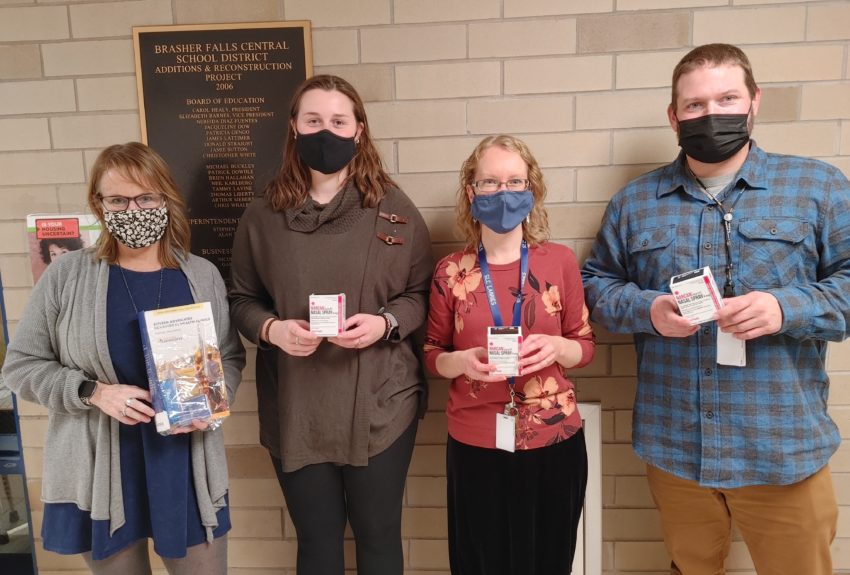Brasher Falls teachers Michelle Rutledge, Katie Aldrich, Nichelle Burnett and Mark LaFave, who attended the course on addiction treatment and education at St. Lawrence Central High School, part of the Brasher Falls Central School District. The program focused on adolescent signs and symptoms of opiate drug use and opioid overdose prevention training.
Focus on signs of drug use and overdose prevention
Opioid abuse has surged across the country in recent years, but the problem is particularly acute in St. Lawrence County, where hospital discharges involving opioid use were more than twice the New York State average in 2020.
“In our North Country communities, there is a vital need for safe, effective treatment solutions to combat the opioid epidemic,” Citizen Advocates’ Director of Behavioral Health Kaitlyn Gervais said. “Our highly trained and caring team is well-equipped to answer this call.”
As part of that response, Registered Nurses from Citizen Advocates’ Massena Outpatient Behavioral Health Clinic recently taught an afternoon course on addiction treatment and education at St. Lawrence Central High School, part of the Brasher Falls Central School District. The program focused on adolescent signs and symptoms of opiate drug use and opioid overdose prevention training.
A key part of the course touched on how to safely administer naloxone, commonly known as Narcan, a nasal spray that rapidly reverses an opioid overdose. The medication—an opioid antagonist—is available with or without a prescription and is not a controlled substance.
“There’s a stigma attached to medically-assisted treatment,” said Lori Burke, Associate Director of Behavioral Health. “Oftentimes it is misperceived as treating addiction with more drugs, but that is not the case.” But according to Ms. Burke, that stigma creates the reverse effect, resulting in individuals not getting the help they need, tragically causing more overdoses and more deaths. “We want to educate the community to reduce stigma and save lives.”
“I feel like I now have the knowledge to jump in with Narcan if it’s needed,” said Brasher Falls Fifth Grade teacher Katie Aldrich, who took the course. “I know what I can do in that situation with the tools I was given.”
“I feel like I’m more empowered to help other people during a crisis situation,” agreed Eighth Grade teacher Kayla Phelix. “And the process of going through the training was painless.”
Ms. Aldrich and Ms. Phelix were two of the more than 50 Brasher Falls Central School District teachers and staff who attended the course, which also trained them in how to recognize signs and symptoms of drug use in their students, such as unexplained mood swings, defensiveness regarding actions and missing excessive time from school. The program also educated the teachers and staff about the different types of opioids, such as oxycodone, heroin and morphine, and how to recognize the signs of an opioid overdose.
The opioid addiction and treatment course was made possible by a federal grant through the Substance Abuse and Mental Health Services Administration (SAMHSA) to further the Massena Outpatient Behavioral Health Clinic’s integrated care model, which emphasizes community education and awareness.
The Brasher Falls course was the first of its kind for Citizen Advocates but only the latest piece of a partnership between the health and human services agency and St. Lawrence, Franklin and Hamilton county school systems. Citizen Advocates currently offers school-based counseling and prevention services at more than 20 schools across the North Country, with additional schools to be added shortly, including one in Ogdensburg, the site of the agency’s new Behavioral Health Urgent Care clinic.
“Our on-site, school-based clinicians play an integral role in providing assessment, appropriate referrals and ongoing supportive treatment to kids and their families throughout the North Country,” Ms. Gervais said. “We are so grateful to have opportunities to partner with these school districts.”


 Previous Post
Previous Post


